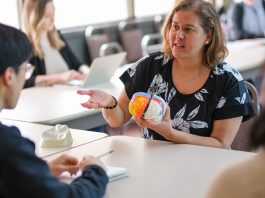Biobased Value Circle establishes a paradigm shift in the innovation process for biobased materials to accelerate the transition from a fossil-based to a biobased circular economy.
Biobased Value Circle trains the new generation of industrial doctorates in the transition towards biobased value circles. It offers a unique interdisciplinary research and training environment tailored for 12 PhD researchers excited by the development of innovative biobased products, respecting the principles of the circular economy.
The mission of Biobased Value Circle is to establish a paradigm shift in the innovation process for biobased materials to accelerate the transition from a fossil-based to a biobased and circular economy. This is essential to tackle urgent societal issues, such as climate change and plastic pollution.
The programme brings together cutting-edge research and development spanning the biobased materials value circle, involving companies (including SMEs) and academic institutes across Europe. The Biobased Value Circle consortium consists of four European universities, one research institute, and eight European companies that hired PhD researchers or hosted secondments as part of the training programme co-ordinated by Maastricht University.
The objective is to train PhD researchers in a set of 12 interlinked projects that cover the conversion of biomass to materials, the development of materials into applications, the environmental and economic impact of biobased materials, and the societal changes required to transition to a circular biobased economy. Together, the PhD researchers will contribute to the development of a common language and methodology to stimulate co-operation along the value circle and speed up the product development process.
The industry and academic participants co-supervised stimulating research projects to provide each PhD researcher with valuable insights into the industry and academic research environments. Next to that, it is paired with a range of inspiring training modules that reflect the unique interdisciplinary and inter-sectorial environment created by Biobased Value Circle, including training relevant to the biobased industries and academic, industrial, and transferrable skills. This ensures that the values of the European Industrial Doctorates Program are addressed by creating a new generation of researchers who will benefit from crosscutting skills that allow them to thrive in both industry and academia, leading to more co-operation between these sectors and enhancing the competitiveness of Europe.
Research
Biobased Value Circle aims to contribute to the development of the biobased circular economy by removing the barriers: No common language and methodology for product development, no integration of the social and environmental impacts and insufficient Life Cycle Assessment methodology. This long-term aim cannot be achieved by Biobased Value Circle alone. The 12 PhD projects are the first essential steps, targeting strategically chosen biobased products. The projects all develop a common language and methodology. On the one hand, this contributes to solving specific problems in each value circle. On the other hand, the experiences of each PhD researcher contribute to the improvement of the biobased value circle methodology.
The mission is to establish a paradigm shift and accelerate the innovation process to reach the market.
The specific objectives of Biobased Value Circle research projects are to develop:
• Biobased fibres for two technical applications;
• Biobased fibres for three medical applications;
• Biobased functional polymers for four technical applications;
• A common interdisciplinary language to facilitate communication between all experts involved in the development of biobased value circles (product engineers, chemists, biologists, economists, sustainability scientists, sociologists, etc.);
• A product development methodology to facilitate collaboration of all experts involved in developing biobased products. The method spans the entire value circle, including all development steps from product design and laboratory research to full-size industrial applications. Scaling of processes is a key element of the methodology. It allows for swift iteration over the entire value circle and to collect input from all disciplines involved. The methodology takes into account the environmental performance of the processes under development; and
• An improved Life Cycle Assessment methodology to assess the environmental impact of circular biobased products.
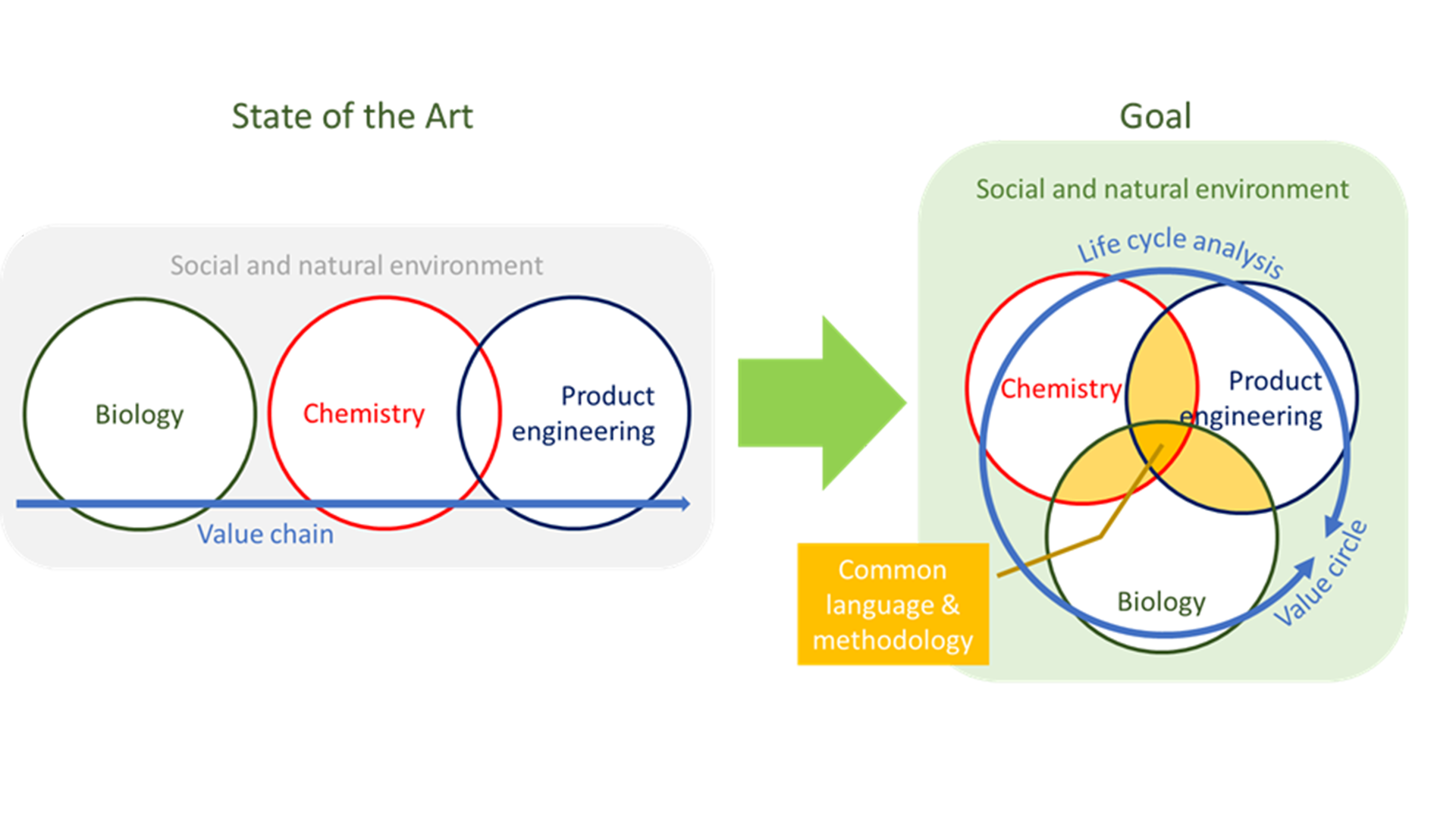
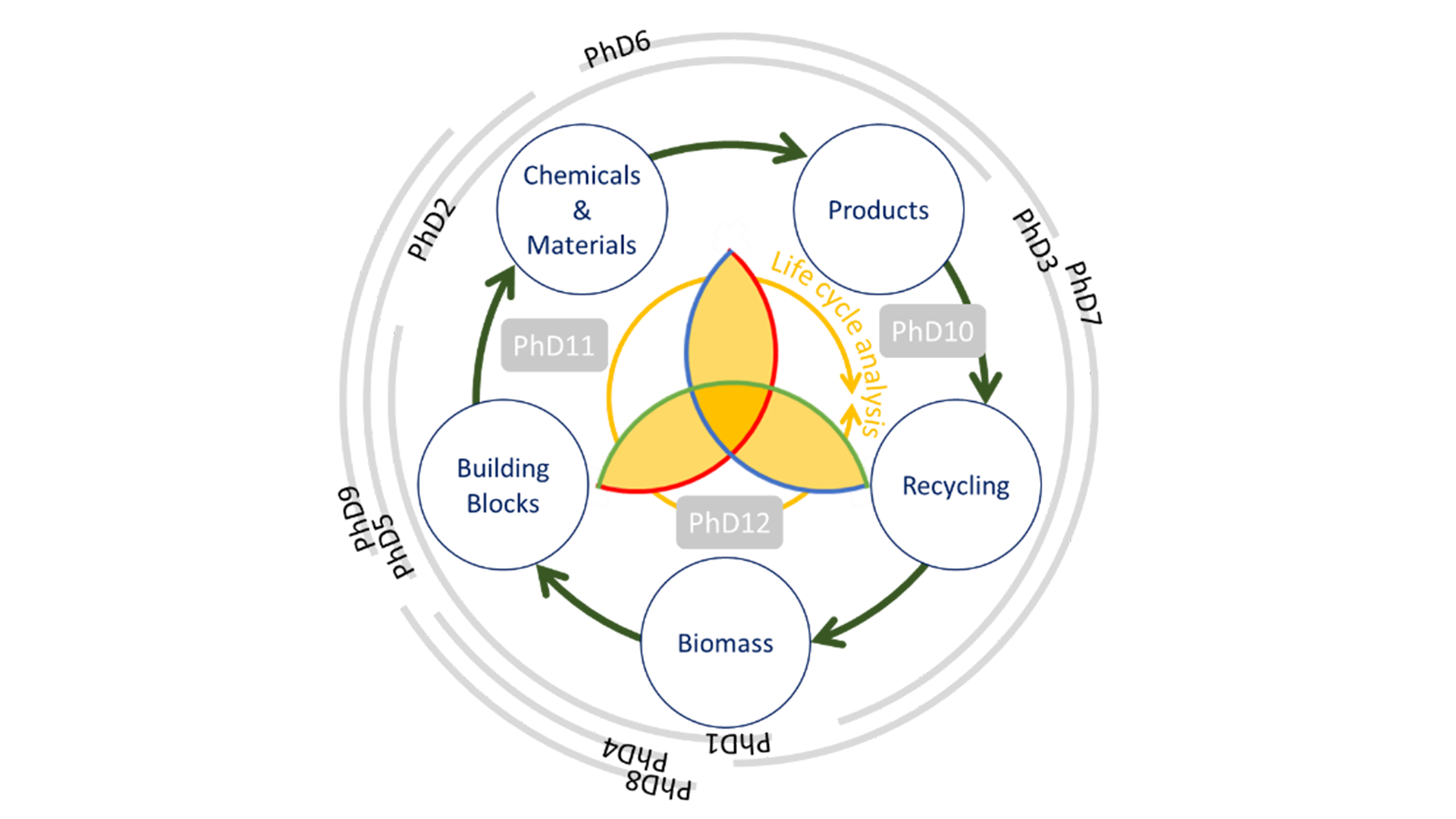
Training
A distinctive training programme was developed for PhD researchers, specifically tailored to equip them with the essential competencies in developing biobased products. The curriculum is meticulously designed to transform knowledge and ideas into products and services that yield economic and social benefits. The key competencies encompass:
- Proficiency in the common language and methodology;
- Understanding the applications of developed technology and its impact on the environment;
- Ability to collaborate in multidisciplinary teams;
- Disciplinary expertise in biobased product development;
- Capability to function in agile working environments (self-management);
- Comprehension of industrialisation principles and economics;
Effective communication with laymen from public organisations and the general public; and - Addressing public concerns within their research.
To ensure high-quality supervision, each PhD researcher is supported by a dedicated team of experts. A Personal Career Development Plan, co-ordinated with supervisors, was drafted by each researcher. This plan encompasses research objectives, as well as the researcher’s training and career needs, including transferable skills, teaching, publication planning, and conference participation.
The training programme includes personalised training for each PhD related to the research topic and personal needs. In addition, each PhD spends at least 18 months conducting research at an academic institution and another 18 months at an industrial host, facilitating the inter-sectoral knowledge exchange. Finally, Biobased Value Circle offers network-wide training consisting of joint sessions for all PhDs. The network-wide training events leverage the interdisciplinary and inter-sectoral aspects of the Biobased Value Circle, exposing PhD researchers to diverse schools of thought. The programme includes training modules addressing key transferable skills common to all fields, fostering a culture of open science, innovation, and entrepreneurship. Across the six organised events, the consortium has conducted 35 training sessions, including doctoral seminars where progress on research projects was presented. The development of the common language and methodology was discussed at each event. Seven training events, each spanning three to five days, were offered, culminating in a final conference in May 2024.
The Biobased Value Circle fellowships awarded to PhD researchers will lead to a doctoral degree, with each researcher enrolled in a doctoral programme at their respective university.
BIOBASED VALUE CIRCLE CONSORTIUM PARTNERS
Universities:
• Maastricht University – Aachen-Maastricht Institute for Biobased Materials, coordinator
• Universitätsklinik Aachen – BioTex Institute
• Karl Franzens University of Graz
• National University of Ireland Galway
Research Institute:
• Deutsche Zentrum für Luft- und Raumfahrt
Companies:
• B4Plastics
• ChemStream
• Fibrothelium
• IFG Asota
• KEEY Aerogel
• Accenture
• Spintex Engineering
• Technical Proteins Nanobiotechnology

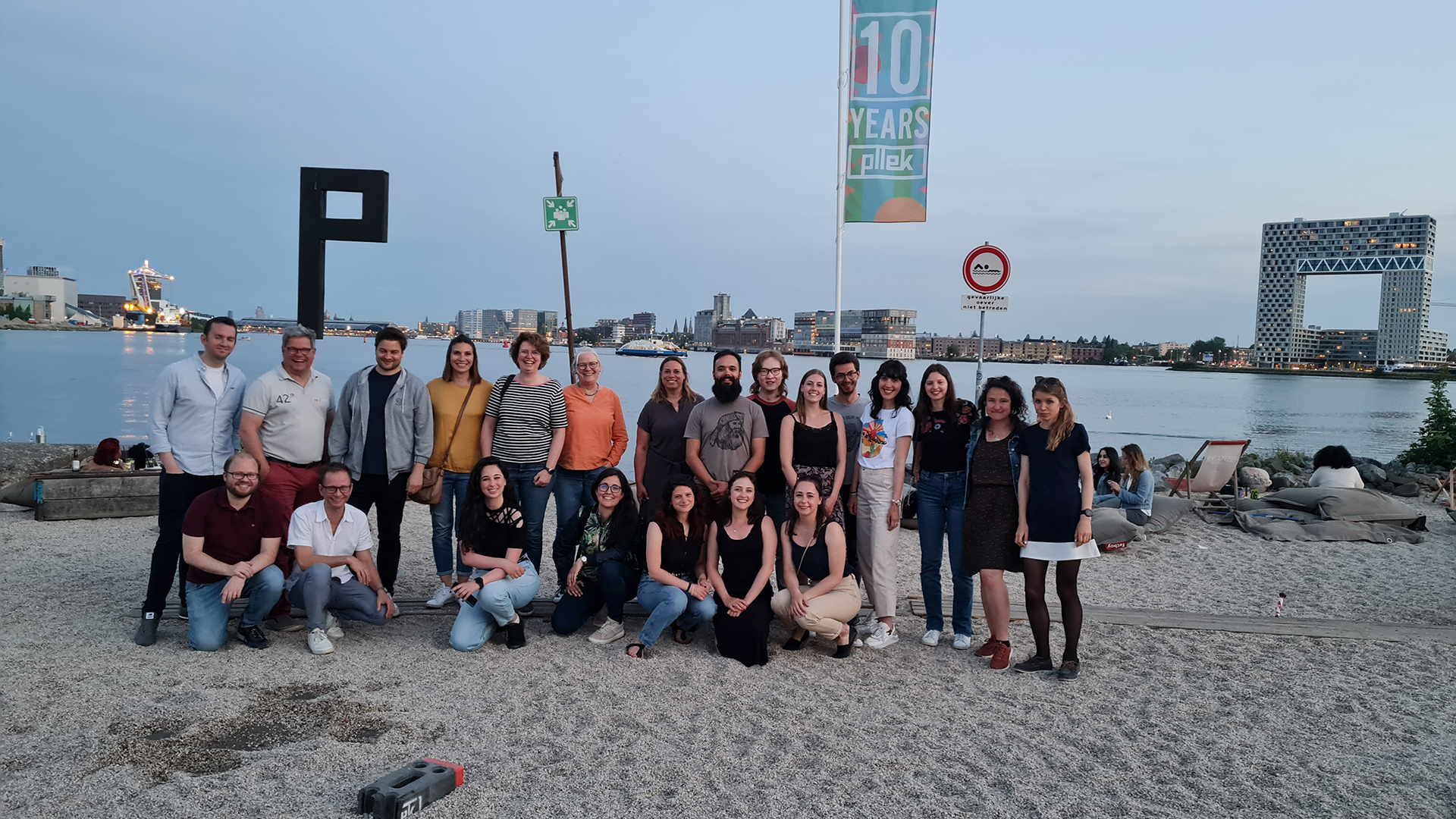
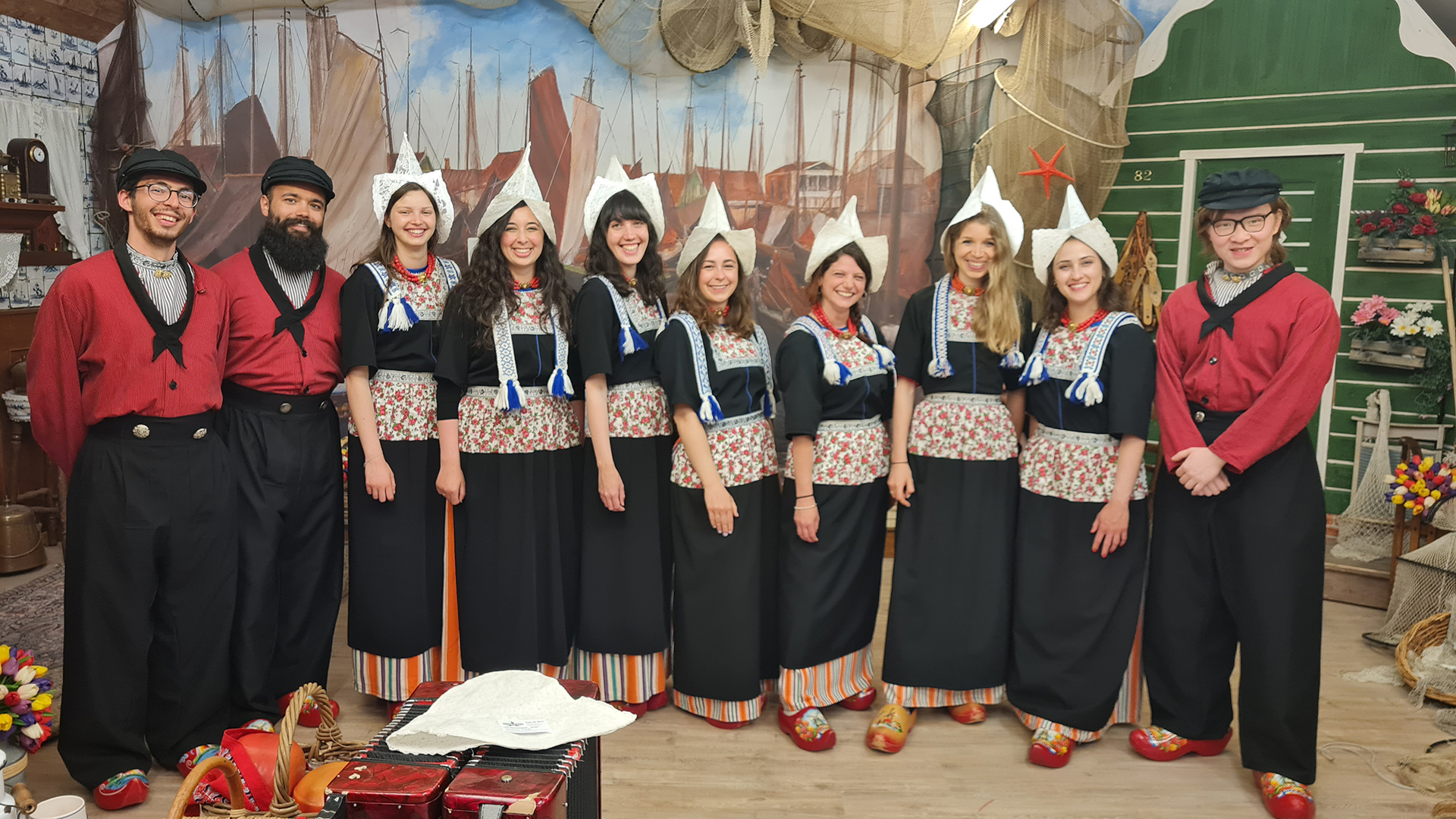

ACTIVITIES AND IMPACT
All PhD projects can be found on the Biobased Value Circle website. PhD researchers one, two, eight and nine aim to develop biobased fibres for medical applications. PhD researchers three, four and five develop biobased functional polymers for technical applications. PhD researchers six and seven aim to use biobased materials for technical applications; PhD researcher ten develops an adapted Life Cycle Assessment methodology for circular biobased products. PhD researcher 11 investigates a common language to facilitate communication between all experts in developing biobased value circles; PhD researcher 12 focuses on organisational change to transition toward the circular economy.
The project strives to impact on three levels:
• Create scientific output with the research performed that leads to impacts on technology, innovation, and society by exploiting and disseminating the results;
• Enhance the career perspective and employability of researchers and contribute to skills development; and
• Contribute to structuring PhD researcher training at the European level and strengthening the European innovation capacity.
Dissemination and exploitation of results
Published scientific articles from the research inform the scientific community and relevant companies about the results. A joint first patent application is being prepared for two projects, while one more patent application is anticipated. Policymakers, the general public, and other relevant stakeholders are informed via social media (LinkedIn), the Biobased Value Circle website, and other media channels.
To date, PhD researchers have actively engaged in distinct science fairs, exhibitions, or open days and have either led or supported workshops and training sessions within their respective research fields. They have showcased their work through networking events, fostering collaborations with over 29 companies spanning diverse sectors. Furthermore, PhD researchers have contributed to a short video, a live stream, and a newspaper publication. Looking ahead, the remaining timeline for outreach activities primarily revolves around the Biobased Value Circle Symposium scheduled for 16 May 2024.
The symposium will showcase the extensive highlights of the Biobased Value Circle project, bringing together industry and academia and informing the general public of the project results. It will be structured around the four project strands: Biobased materials for technical applications, medical applications, functional polymers and sustainability, business transformations, and common language. Keynote speakers will contribute to the discourse by addressing and presenting their views on the Biobased Value Circle topics. The event will facilitate discussions on each subject and provide ample space for networking, socialising, informing businesses on opportunities to implement the results, and both formal and informal discussions between all participants.
Innovative PhD research and training at a European level
The non-academic sector provides an essential contribution to the training. All Biobased Value Circle PhD researchers are supervised by academic staff, and a non-academic/industrial supervisor is assigned to them. Furthermore, each PhD researcher has both academic and non-academic secondments. This gives PhD researchers the opportunity of an early international research experience and provides them with a broad skill set that includes not only research skills but also an entrepreneurial skill set and valuable tools for the future.
Network creation and impact on the consortium partners
The recruitment and the first Biobased Value Circle training event with the project consortium created a positive atmosphere between the consortium partners and PhD researchers. The first event focused on getting to know each other and the individual research topics, providing each PhD researcher with a chance to train their presentation skills. The action enhanced collaboration and led to a fruitful exchange of ideas and experiences. The PhD researchers were provided with transferable skills and scientific expertise during the second and third events. To foster and encourage team spirit, monthly online coffee breaks were organised to meet, where the consortium members were invited to give masterclasses and share personal career experiences. The main goal of the third event was to build and foster a strong community among the PhD researchers, so these training sessions took place on a sailing boat. This encouraged the group to work together beyond the training sessions and to function as a team. The tone was set for the upcoming events, which proved highly successful. We eagerly anticipate the final event, including a concluding conference with invited external speakers and participants next to Biobased Value Circle speakers. In summary, the PhD researchers have quickly formed a close-knit Biobased Value Circle network, which they freely use for their research and future.
The PhD researchers indicated that the project had had a major impact since the first year. One impact area was self-development: Starting one’s research career, developing as an early-stage researcher, and learning academic and industrial subjects. Another impact was the network collaboration and interaction: having the possibility to co-operate with a network of other PhD researchers and supervisors as well as with both academic and industrial organisations and to receive feedback from a range of colleagues with different expertise and viewpoints. Thirdly, gaining experience in technologies and critical thinking are among the mentioned positive impacts.
Consortium partners reported that the recruited PhD researchers are strengthening the research focus in the respective fields and the industrial perspective. As a result, they positively impact the research teams in terms of fresh ideas, motivation, and social group dynamics. Industrial project participants stated that the co-operation with the project’s academic consortium members gives an excellent view of ongoing topics and research areas in the field and is a great opportunity to expand their network and use the knowledge in industrial practices. Having a PhD researcher focusing on a certain study topic that can benefit more projects and activities within the company is a unique opportunity for the industrial partners.
PhD researchers’ career perspectives and employability
As a result of the dedicated training and research programme, the Biobased Value Circle PhD researchers have acquired a unique combination of academic and non-academic skills and knowledge that will excellently position them in a market that is in urgent need of highly skilled researchers and clearly distinguish them from all other researchers at the same stage of their career. More importantly, their experience in both academic and industrial environments, the opportunities offered to personalise their expert training programme, active mentoring, and networking within the consortium will allow them to plan their career path and pitch in interviews why they are most suitable for a particular job. The PhD researchers have already experienced that their contribution to the companies is unique due to the interdisciplinary nature of Biobased Value Circle. It is fantastic to see how the PhD researchers have developed over time into independent scientists who interact easily across disciplines and will propagate this way of working in their next career steps and organisations.
This project has received funding from the European Union’s Horizon 2020 – Research and Innovation Framework Programme under the H2020 Marie Skłodowska-Curie Actions grant agreement No. 956621.
Please note, this article will also appear in the seventeenth edition of our quarterly publication.



